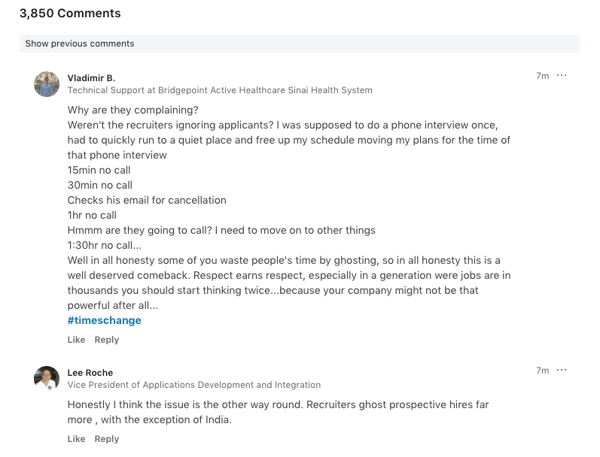In the fast-moving world of recruitment, employers are beginning to experience a new problem; ghosting. What is “ghosting” exactly? Well, it’s basically when someone pulls back from all contact. The full Oxford definition can be found here.
Chip Cutter, Editor at Large at LinkedIn wrote an excellent LinkedIn Pulse article on the subject. He noted, “Where once it was companies ignoring job applicants or snubbing candidates after interviews, the world has flipped. Candidates agree to job interviews and fail to show up, never saying more. Some accept jobs, only to not appear for the first day of work, no reason given, of course. Instead of formally quitting, enduring a potentially awkward conversation with a manager, some employees leave and never return. Bosses realize they’ve quit only after a series of unsuccessful attempts to reach them. The hiring process begins anew.”
We went into the trenches of LinkedIn to learn more about why people ghost, if people have been ghosted and why they think the ghosting rate is on the rise. Here are some of the questions and responses:
Have you ever ghosted an employer? Why?
From Rhianna Johnson, M.S., Director of Career Development, Sacramento Job Corps Center
“I have ‘ghosted’ an interview when the institution didn't respond to email questions. I figured if they didn't have time to respond they didn't respect my time and broke the bond of professionalism, which indicates that it's not a good place to be.”
Why do you think professional (or unprofessional) ghosting is on the rise in companies?
From Kira Leigh, CEO at www.THEREISNO.design
“Because employees are also getting tired of being ghosted by hiring managers and recruiters or given automated email messages that are in no way indicative of anything but a canned email.”
Have you ever had an employee or potential hire ghost you? Were there warning signs?
From Maria Foley, Marketing Action Team Specialist, Travel Oregon
“I’ve had a potential hire ghost me. I had already interviewed her and decided she was the best match for the job, with a very strong runner up for the position. But when I reached out to her by phone and email to let her know we would be offering her the position, it was crickets .
After a week of no responses, I offered the position to the other top candidate. It turns out that the first choice candidate was on a family vacation and didn’t check her messages - you snooze, you lose!”
We should note here that Maria considered herself ghosted when a lack of communication arose due to a vacation. It was an unfortunate situation for this candidate and could’ve been avoided if the person in question warned the recruiter that they were planning an out of touch vacation. It’s always a best practice to stay keep communication flowing on both sides.
So you want to avoid getting ghosted by potential hires and recently onboarded employees? Here are our top tips.
1. Stay in Communication with Your Candidates
To Kira’s point, employees have been ghosted for years by employers and now the trend is beginning to backfire. To back that up, here are some of the notable comments on Chris Cutter’s story:
As you can see there are some who feel that the action is a direct reaction to the treatment recruiters demonstrate with candidates, while others simply find it prevalent the other way around.
To avoid being ghosted, a good practice is to simply to not ghost. Stay in communication with your candidates. Make them feel like you want them to work for you. Do not promise something that you can’t deliver. Many candidates will take another offer even if they don’t prefer it due to radio silence.
2. Write Relevant, Honest Job Descriptions
One consideration which doesn’t seem to be talked about much is that sometimes roles can be misrepresented in the job description or the interview. The best way to avoid this problem is to make sure your job descriptions are well written so that there isn’t a feeling of surprise or anger on day one. Writing accurate job descriptions that are clear will help you find the right candidates.
If you need tips for writing job descriptions, check out our Indeed postings blog here.
3. Foster Relationships with Employees
While we can’t give you specific data on this, a potential pitfall with any workplace dynamic is the relationship between a boss or supervisor and their employees. If the employees feel that there is an intimidation factor present, there is the potential for them to leave without telling anyone. While this is unprofessional, the thought process makes sense. Imagine you were a person who doesn’t do well with confrontation and you knew telling your boss your feelings would result in a conflict; would you feel an urge to just walk away? You might.
Encouraging ongoing feedback and dialogues enriches the culture of your company and minimizes turnover. Consider this relevant quote, “a person who feels appreciates will always do more than expected.”
So tell us, have you ever ghosted? Have you been ghosted? Leave us comments!
—
Are you looking for more recruitment content? Subscribe to our blog.












